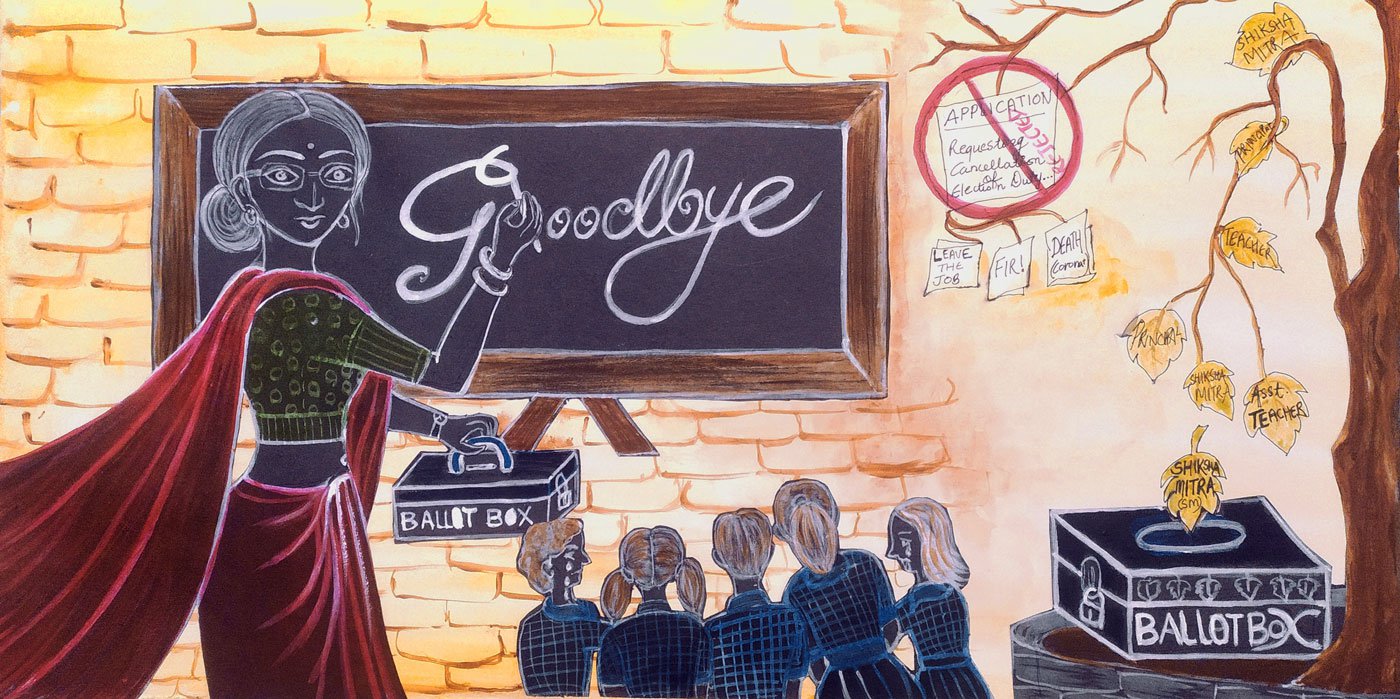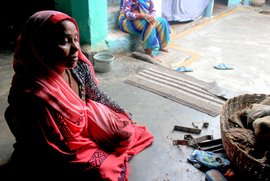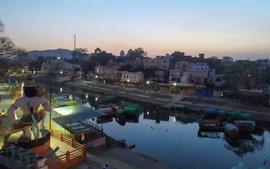“She cries for hours on end, asking me to bring her mother,” says Shishupal Nishad of his seven-year-old daughter Navya. “But where do I bring her from? Even I feel I’m taking leave of my senses. We haven’t slept in weeks,” adds the 38-year-old labourer from Singtauli village in Uttar Pradesh.
Shishupal’s wife Manju – Navya’s mother – was a ‘ shiksha mitra ’ or para-teacher in the Singtauli primary school in Jalaun district’s Kuthaund block. Her name is No. 1,282 on the list of 1,621 schoolteachers who died of Covid-19 after compulsory duty in UP’s panchayat elections. To what was a five-member family till her death, though, Manju Nishad was much more than a number.
She was a mother of three and the family’s sole breadwinner, bringing home just Rs. 10,000 a month – the pathetic sum paid to shiksha mitras who work on contract and have no security of tenure. Even for someone like Manju, who had worked in that capacity for 19 years. A shiksha mitra does indeed teach, but is categorised as a teaching assistant (or teacher’s helper).
Shishupal himself worked as a labourer for Rs. 300 a day on the construction of the Bundelkhand Expressway until “the phase of the Expressway where I was working was completed two months ago. And no other construction work was happening nearby. We were managing these past months on my wife’s income.”
Thousands of teachers were assigned election duty in UP’s mammoth four-phase panchayat elections held on April 15, 19, 26 and 29. The teachers first went for a day’s training, then for two days of polling work – one day for preparation and the second the actual day of voting. Later, thousands were again required to report to count the votes on May 2. Fulfilling these tasks was mandatory and the pleas of the teachers’ unions for a postponement of the polls was ignored.
There are 193
shiksha mitras
in the list of 1,621 – drawn up by the UP Shikshak Mahasangh (Teachers’ Federation) – who died. Of these, 72 were women, including Manju. On May 18, however,
a press note
issued by the UP Basic Education Department held that, as per Election Commission guidelines, only those who died on the job are entitled to any compensation. And in the case of the teachers, this would mean only those who died precisely at their duty venue, or on their way home. As the press note says: “A compensation amount is due if a person dies of whatever cause during this time period, which will be sanctioned by the State Election Commission.”
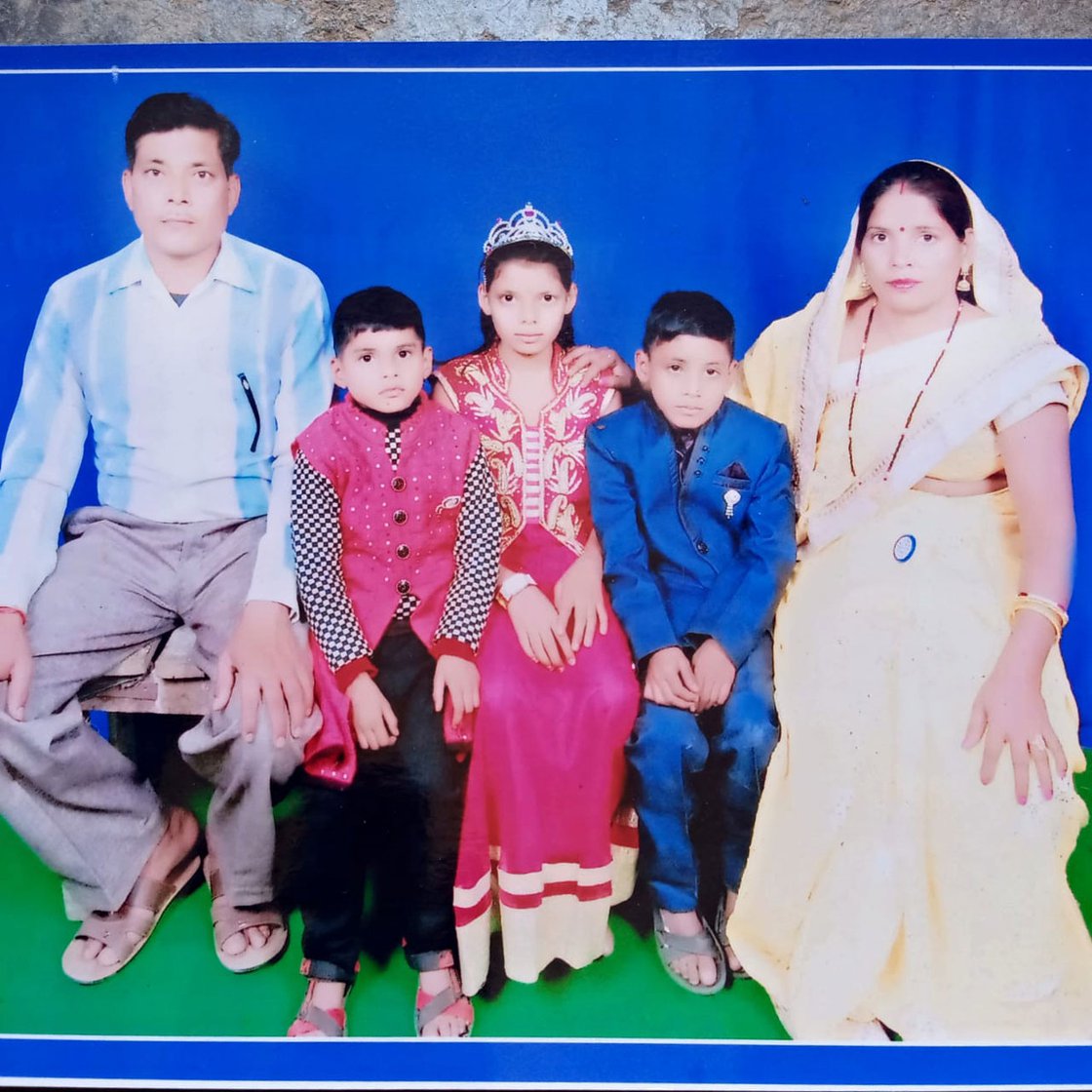
Shishupal Nishad with Navya, Muskan, Prem and Manju: a last photo together of the family
Building on that interpretation, the press note says: “The district administrators have informed of 3 teachers' deaths to the State Election Commission [SEC].” This would exclude 1,618 teachers who were infected at either the training, voting, or counting venues but died days later at home. And completely disregards the nature of the coronavirus infection and how it kills, and the time it takes to do so.
The Shikshak Mahasangh responds with scorn, saying the authorities should look at their full list “so that the government can tally the remaining 1,618 who they must have missed while confirming the demise of only three teachers,” Mahasangh president Dinesh Sharma told PARI.
Manju Nishad reported for polling centre duty in Kadaura block of Jalaun district on April 25, the day of preparation before actual voting on the 26th. She had attended a training camp a few days prior to that. It was on the night of April 25 that she became really ill.
“All of this happened because of the government’s carelessness. My wife had tried speaking to some higher official, requesting leave as she felt the need to go home. He just told her: ‘if you want a leave, you leave the job’ – so she went on with the duty,” Shishupal says.
She returned late night of April 26, after completing voting duty in a hired vehicle. “She complained of uneasiness and fever,” he adds. When she tested positive for Covid-19 the next day, Shishupal took Manju to a private nursing home, where they were told she needed hospitalisation for a week – at Rs. 10,000 a night. Simply put: each day at the hospital would have cost what she earned in a month. “That’s when I got her admitted in a government hospital,” says Shishupal.
Manju’s anxiety, he says, was entirely focused on what the kids would do at home without her, what they would eat. On May 2, her fifth day in the hospital – and what would have been her counting duty day – she died.
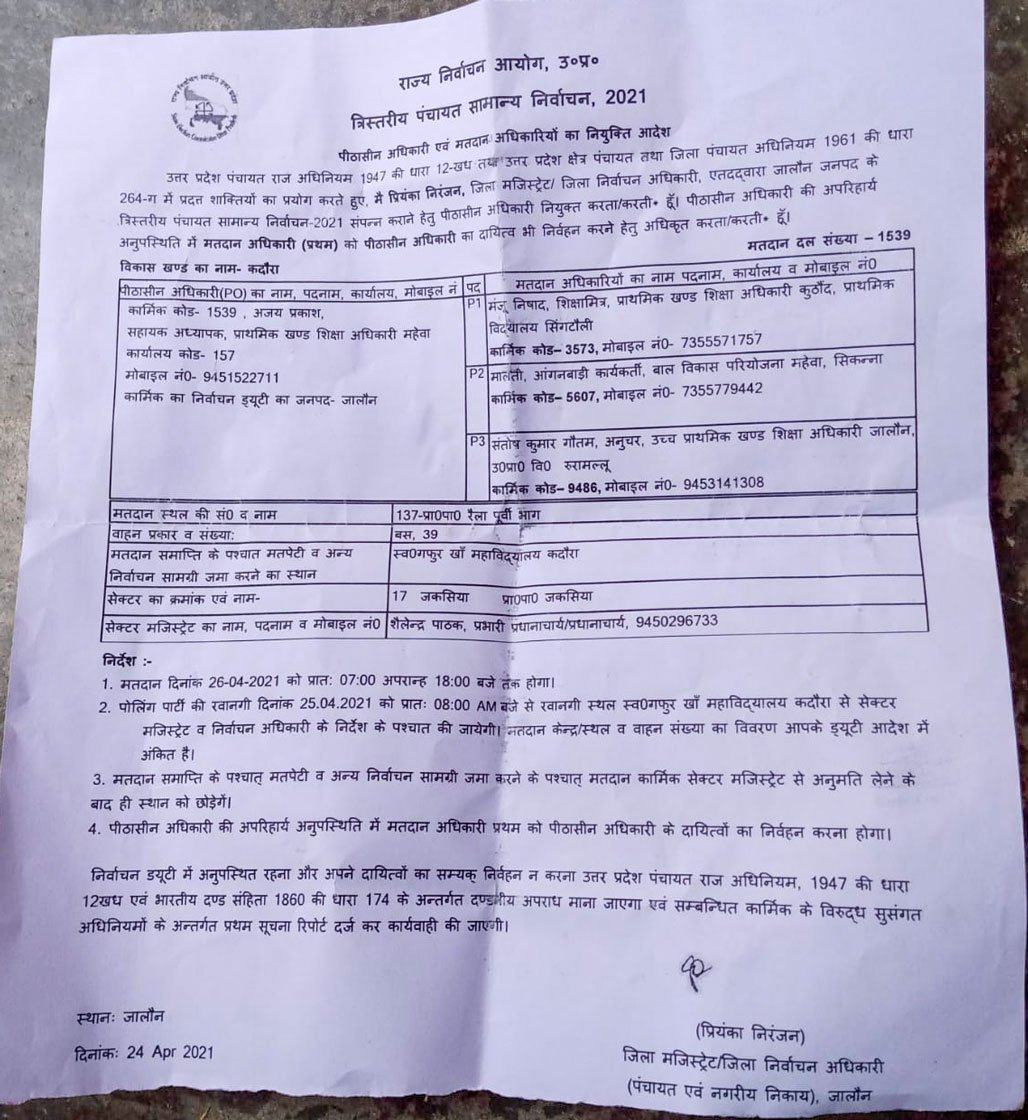
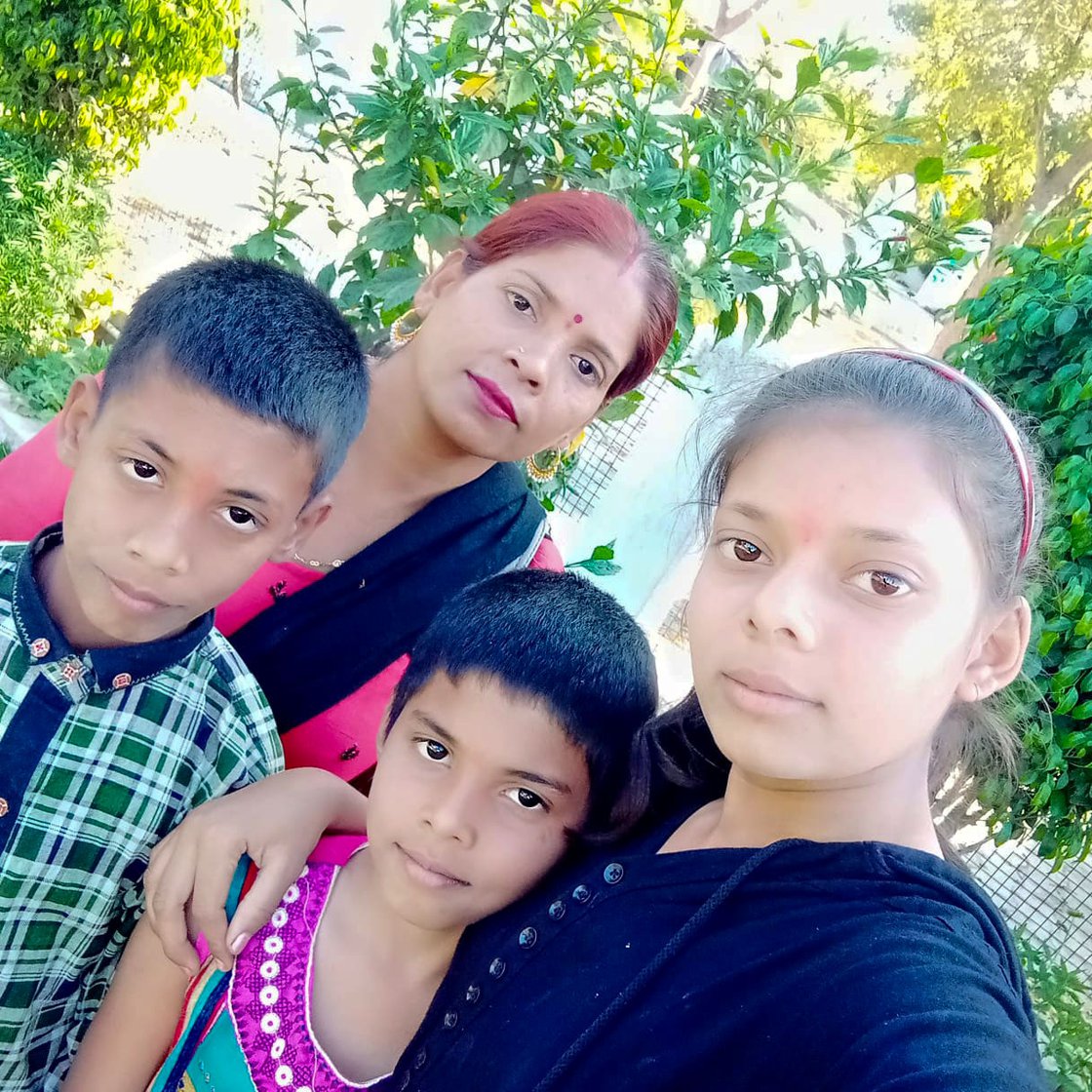
Manju's duty letter. Thousands of teachers were assigned election duty in UP’s mammoth four-phase panchayat elections in April. On May 2, her fifth day in the hospital – and what would have been her counting duty day – Manju (right, with her children) died
“My mother died of a heart attack three days later. She kept saying ‘what will I do being alive, if my bahu (daughter-in-law) is gone’, says Shishupal.”
He wonders how he will provide for their children. Navya has two siblings – her sister Muskan is 13, and brother Prem is 9. The monthly rent for the place they live in is Rs. 1,500. He has no idea how they will cope: “I don’t understand anything now. I have lost my mind – and in months my own life will be gone, too,” he says helplessly.
*****
Besides the human tragedy, the situation also draws attention to the wretchedness of the shiksha mitra system. The scheme – which exists in different states – came up in Uttar Pradesh in 2000-01. Hiring these teacher assistants on contract was a way of cutting budgets on the education of less privileged children who go to government schools. What it ended up doing, in a bad job market, was also getting very highly qualified people to work at Rs 10,000 a month – a fraction of what was paid to regular teachers.
A
shiksha mitra
is required to have passed the
Intermediate or equivalent
level. The pathetic wage was justified on the grounds that this qualification had been greatly lowered. But Manju Nishad had an MA degree. Like her, thousands of other
shiksha mitras
are over-qualified for the post but have few options. “They’re undoubtedly exploited, badly so. Why, otherwise, would people with B Ed and MA degrees, some even with PhDs, work for 10,000?" asks Dinesh Sharma.
Jyoti Yadav, 38 – No. 750 on the list of teachers and other staff who died – worked as a shiksha mitra in primary school Tharwai in Soraon (also spelt Soraav) block of Prayagraj district. She had a BEd degree and had even passed the Central Teacher Eligibility Test (CTET) in January this year. But, like Manju Nishad, was earning Rs. 10,000 a month. And had been at the job for 15 years.
![Sanjeev, Yatharth and Jyoti at home: 'I took her there [for poll training] and found huge numbers of people in one hall bumping into each other. No sanitisers, no masks, no safety measures'](/media/images/04-IMG-20210523-WA0022-JM.max-1400x1120.jpg)
Sanjeev, Yatharth and Jyoti at home: 'I took her there [for poll training] and found huge numbers of people in one hall bumping into each other. No sanitisers, no masks, no safety measures'
“My wife’s poll training was on April 12 in Motilal Nehru Engineering College, Prayagraj city,” says her husband, Sanjeev Kumar Yadav, 42. “I took her there and found huge numbers of people in one hall bumping into each other. No sanitisers, no masks, no safety measures.
“On returning, she became sick the very next day. Since she had to leave for duty on the 14th (voting in Prayagraj was on April 15), I rang up her principal to ask how she would do the duty now. He said ‘nothing can be done, duty has to be done.’ So I took her there on my bike. I also stayed there with her on the 14th night and then brought her back on the 15th when her duty was over. Her centre was 15 kilometres away from our home in the city suburbs.”
In the next few days, her situation rapidly worsened. “I tried taking her to different hospitals, but they all refused to admit her. On May 2 night she developed severe breathing issues. On May 3, I rushed her to the hospital again, but she died on the way.”
Her death from Covid-19 has shattered the family. Sanjeev Kumar is a graduate in Commerce and holds a Master’s degree in Yoga – and unemployed. He used to work with a telecom company till 2017, when it shut down. After that, he could not find a steady job and thus contributed little to the family’s income. Jyoti, he says, took care of their finances.
Sanjeev worries about how he will now look after their nine-year-old son Yatharth, who has just passed Class 2, and his own elderly parents who stay with them. “I need help from the government,” he sobs.
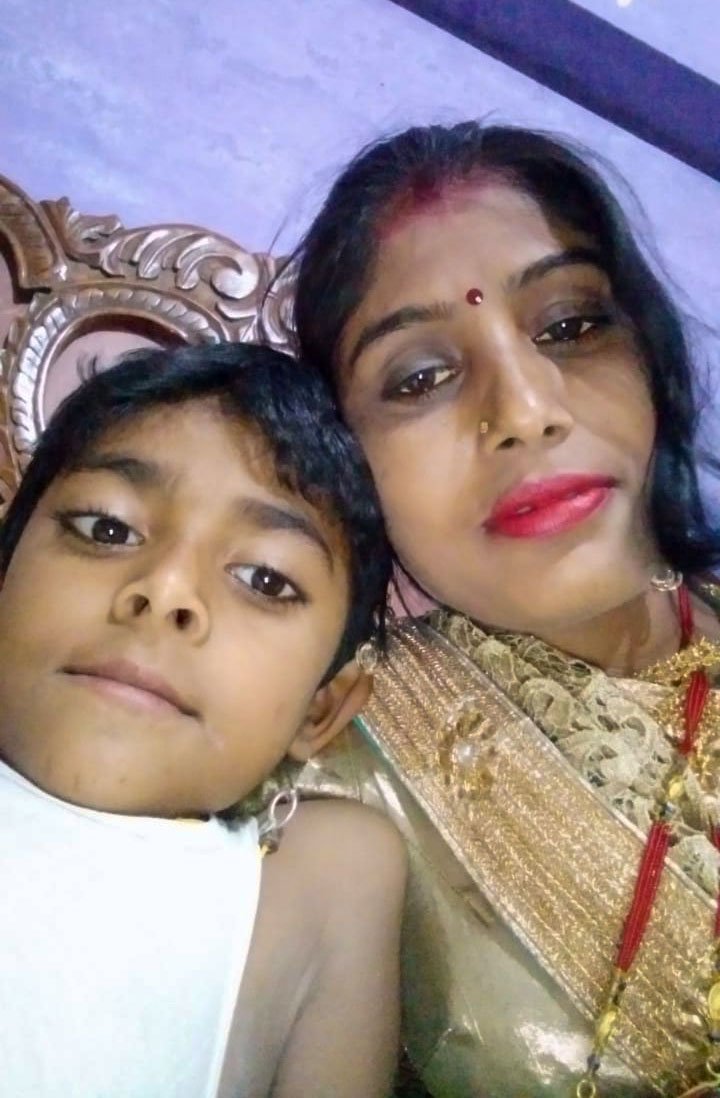
Sanjeev worries about how he will now look after nine-year-old Yatharth
“There are
1.5 lakh
shiksha mitras
in the state who have witnessed drastic changes in their pay scale over more than a decade,” Dinesh Sharma says. “Their journey has been unfortunate. They were first trained in the time of Mayawati’s government, starting at salaries of Rs. 2,250 or so. Then under Akhilesh Kumar Yadav’s government, they were all confirmed in their posts at a salary of Rs. 35,000 [which went up to nearly 40,000 rupees]. But given the controversy over qualifications at the time, those teachers with B Ed degrees opposed the move and the matter went to the Supreme Court.
“The government of India could have amended the rules and not sought mandatory clearing of TET (Teachers’ Eligibility Tests) for those
mitras
who had been working for decades. But they did not. So their salary suddenly went back to Rs. 3,500, leading to several of them taking their own lives in despair. Then the present government brought it up to Rs.10,000 a month.”
Meanwhile the embarrassment of the Basic Education Department’s note saying that so far only three teachers’ deaths met the compensation criteria has compelled the government to respond.
As PARI reported on May 18, the Allahabad High Court had said that the state must grant at least Rs. 1 crore as ex-gratia compensation to the families of polling officers (teachers and other government employees) who died due to Covid-19 after duty in the panchayat polls.
On May 20, Chief Minister Yogi Adityanath directed his government to coordinate with the State Election Commission to “address the current situation.” As he reportedly put it, “Currently the guidelines do not cover the impact caused by Covid-19… within their ambit…the guidelines need to be amended keeping a sympathetic approach.” The state government is “ready to provide all the necessary facilities to its employees, especially at a time when they have done election or any other duty,” he said.
However, says Dinesh Sharma of the Teachers’ Federation, “We have still heard nothing directly in response to our letters from either the government or the SEC. We have no idea how many teachers they are considering and what modifications are being made to the guidelines.”
Nor are the teachers accepting the government’s claim of innocence in holding the panchayat polls in April. “Now the CM is saying he just followed the High Court’s order by conducting the elections when they did. But when the HC ordered the state to lockdown, his government moved the Supreme Court. Also, if the HC said the process was to be completed by April, a second wave of Covid-19 was fast emerging. The government could have sought a review but did not.
“The supreme court, in fact, asked the government if the counting could be deferred by 15 days, instead of holding that on May 2. They and the State Election Commission did not agree. They are talking about the high court – but
refused the supreme court’s offer of postponement
of counting.”
*****
“I had asked the presiding officer on duty at the polling centre whether I could bring mummy home for the night of April 14 and return her there for duty on the 15th – which was voting day in this district,” Mohammad Suhail told PARI on the phone from Prayagraj (formerly Allahabad) city.
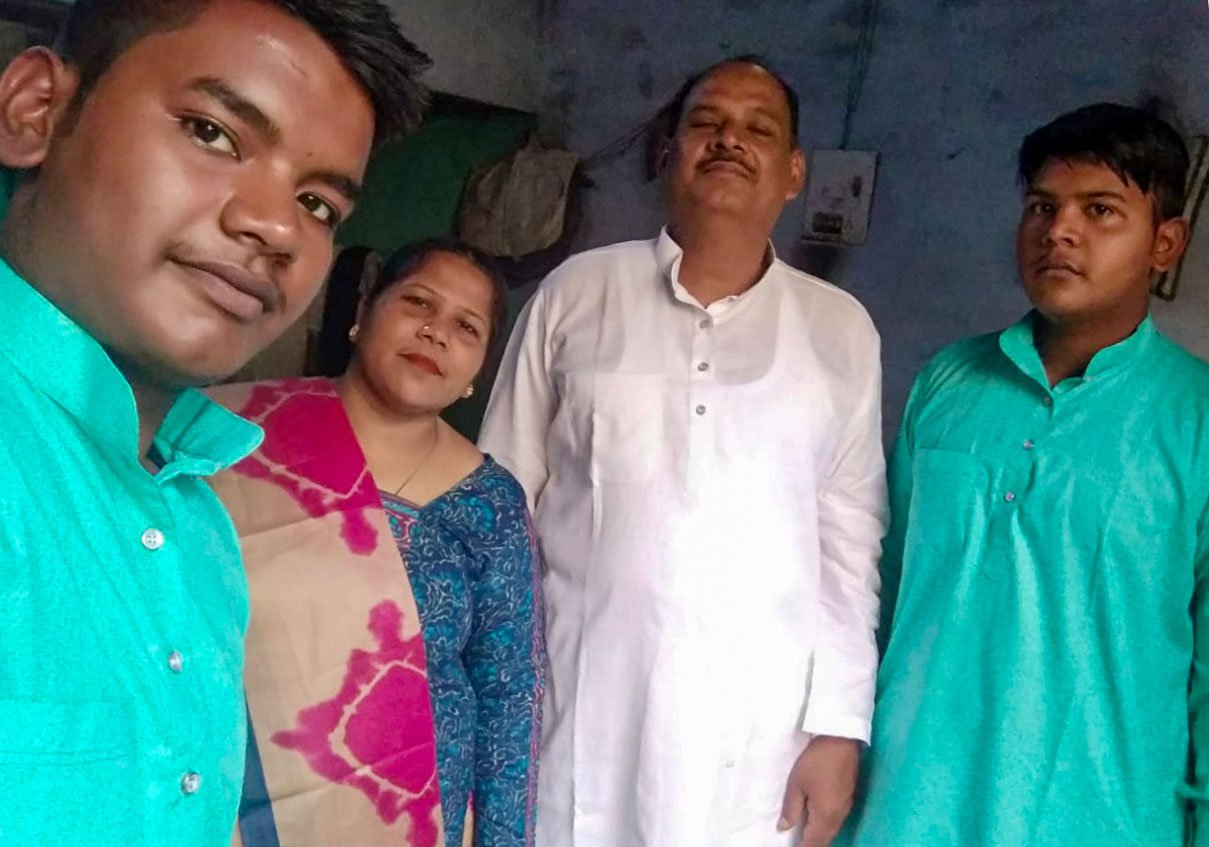
A favourite family photo: Alveda Bano, a primary school teacher in Prayagraj district died due to Covid-19 after compulsory duty in the panchayat polls
His mother, Alveda Bano, 44, was a teacher at Primary School Bongi in Chaka block of Prayagraj district. Her poll duty centre was in the same block. Her name is No. 731 on the list of teachers who died due to Covid-19 after compulsory duty in the panchayat polls.
“The presiding officer rejected my appeal and said it was mandatory that she had to stay there overnight. So my mother returned only on the night of April 15, picked up from the centre by my father. Her health started to worsen three days after she returned,” Suhail said. Another three days later, she died in hospital.
Mohammad Suhail has an elder sister who is married and lives with her husband, and he has a younger brother – 13-year-old Mohammad Tufail, who studies in Class 9. Suhail has completed Class 12 and hopes to take admission in a college now.
His father, 52-year-old Sarfuddin, says he “opened a small medical store last year, right before the lockdown,” which sees very few customers now. “I barely make a profit of 100 rupees in a day. We relied entirely on Alveda’s salary of Rs. 10,000.”
“When the shiksha mitras were promoted as teachers with a pay of 35,000 rupees they were declared non-eligible [for that grade of payment]. Now the same shiksha mitras , many of them with high qualifications, are teaching in the same schools, for 10,000 rupees a month - and there’s no question or discussion of eligibility anymore?” asks Dinesh Sharma.
Jigyasa Mishra reports on public health and civil liberties through an independent journalism grant from the Thakur Family Foundation. The Thakur Family Foundation has not exercised any editorial control over the contents of this reportage.
